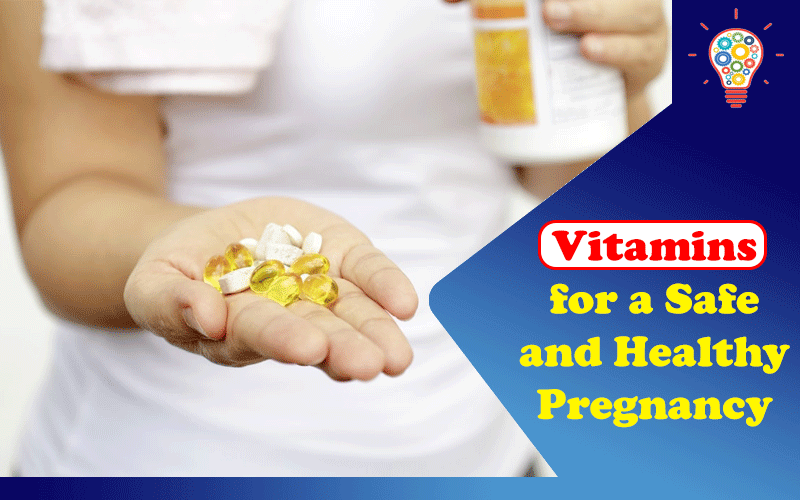Importance of Vitamins for Pregnant Moms
Vitamin supplements are very important for pregnancy, especially in the first 12 weeks, which is also the first trimester.
While you don’t have to take all vitamins during pregnancy at the same dose and at the same time, there are some important vitamins you should take to supplement the foods you take.
You can also take natural-vitamin-rich foods while you’re pregnant.
Vitamin deficiency can cause serious pregnancy disorders, malformations of your baby, and in some cases lead to termination.
Here are the most important fat-soluble vitamins for the development of your baby during pregnancy.
Fat-soluble Vitamins
Vitamin A (retinol)
Vitamin A is particularly important for embryo development, especially the heart, lungs, kidneys, and contributes to normal eyesight and vision.
Vitamin A can be found in foods such as liver, eggs, butter, milk, cheese, carrots.
While vitamin A is important in pregnant, high doses of Vit. A can be dangerous as well, and because of this, some feel it’s one of the pregnancy vitamins to avoid, of course in high doses.
Vitamin D (Ergocalciferol)
Vitamin D is one of the most important vitamins for pregnancy as it plays important role in regulating the calcium and phosphate levels in your body.
It also helps to boost your immune system and that of your baby.
Vitamin D can be found in foods such as butter, fish, oil, egg yolk.
Vitamin E (tocopherol)
Vitamin E is also a very important vitamin to take during pregnancy because it maintains a normal state of the baby’s placenta and the blood vessels.
Vitamin E is also an antioxidant and It improves the immune system’s defensive mechanisms of your baby.
Tocopherol can be found in foods such a green beans, peas wheat, corn, oats, lettuce, liver, kidneys, nuts, and vegetable oil.
Also, you should consult your doctor on doses and when to stop taking this vitamin supplement while you’re pregnant.
Water-soluble Vitamins
Water-soluble vitamins are also important for pregnant women and the following are some of the most important vitamins to take while pregnant.
Vitamin C (Ascorbic acid)
Vitamin C is one of the best supplements for pregnancy which should be taken moderately.
It contributes to eliminating stretch marks on the skin of pregnant women.
Vitamin C is also necessary for the absorption of iron and other nutrients.
Ascorbic Acid can be found in citrus and citrus-like fruits like orange, acerola and foods such as blackcurrant, rosehip, strawberries, green onions, cabbage, tomatoes, spinach, and kiwi.
Vitamin B1 (Thiamine)
Vitamin B1 works in normalizing the nervous system’s functioning.
It also contributes to normal metabolism in the brain tissues.
Thiamine can be found in foods such as bread, legumes, yeast, meat, liver, milk.
Vitamin B2 (Riboflavin)
Vitamin B2 is particularly important in pregnancy, it participates in the cleavage of proteins, fats, and carbohydrates.
Vitamin B2 provides optimal weight gain pace for pregnant women.
Improves the skin, mucous membranes, nervous system.
Riboflavin can be found in foods such as milk, cottage cheese, eggs, liver, meat, yeast.
Vitamin B6 (Pyridoxine hydrochloride)
Vitamin B6 is responsible for the digestion of proteins, fats, and carbohydrates.
It’s also important for your baby’s nervous system formation and development.
Vitamin B6 can help to relieve the symptoms of morning sickness experienced during pregnancy, especially in the first trimester.
Pyridoxine hydrochloride can be found in foods such as beans, yeast, egg yolk, meat, kidneys, milk.
Vitamin B9 (Folic acid)
Vitamin B9 is one of the best vitamins for pregnant women since it plays an important role in the formation of placenta tissue and new blood vessels in the uterus.
A lack of folic acid during pregnancy can lead to its premature termination, hence, it’s always on the lips of pregnant women to take folic acid regularly in the first 12 weeks of pregnancy.
Surprisingly, taking folic acid in the second and third trimesters is not that useful for the baby’s development, and it’s often unnecessary.
Examples of foods you can get natural vitamin B9 are beans, walnuts, Brussels, sprouts, broccoli, hazelnuts.
Usually, doctors prescribe the drugs containing folic acid to pregnant women, and they also recommend taking it while planning a pregnancy.
Vitamin B12 (Cyanocobalamin)
Vitamin B12 is another important vitamin for early pregnancy.
It is responsible for the development of nerve cells and the red blood cells of your baby.
Vitamin B12 can be found in foods such as heart, kidneys, liver, egg yolk, meat, buckwheat, cheese.
Vitamin H (Biotin)
Vitamin H is rarely talked about, and it’s an important vitamin to take while you’re pregnant
The deficiency of biotin can lead to early toxicosis and pigmentation.
Vitamin H can be found in foods such as soy, peanuts, cabbage, apples, onions, tomatoes, yeast.
